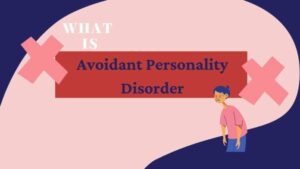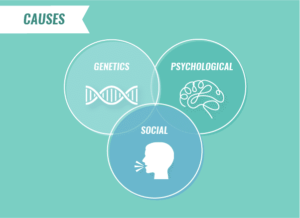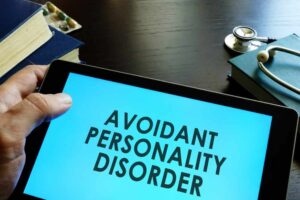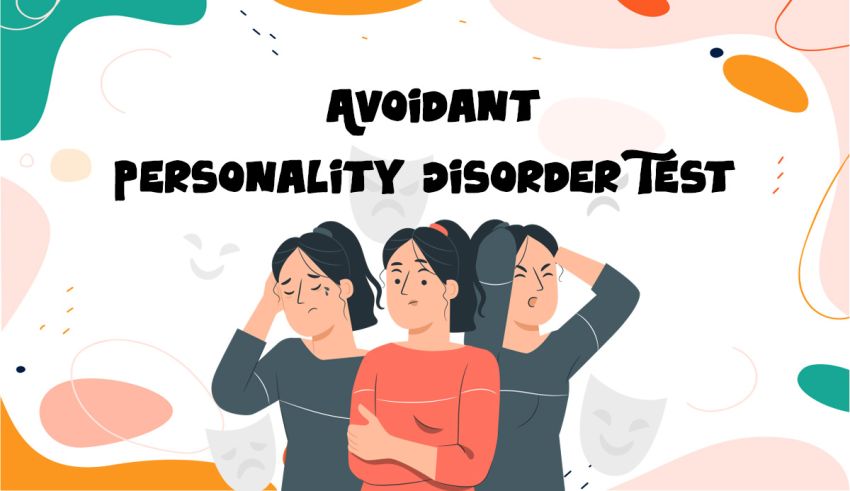An individual with an avoidant personality disorder may have feelings of inadequacy and shyness. They may also avoid social situations because they feel uncomfortable or anxious. If you think you may have this disorder, take our free avoidant personality disorder test below to find out more.
Contents
- 1 What is Avoidant Personality Disorder?
- 2 Symptoms of Avoidant Personality Disorder
- 3 Causes of Avoidant Personality Disorder
- 4 Who Is More Likely Avoidant Personality Disorder?
- 5 Effects Of Personality Disorder
- 6 Understanding Avoidant Personality Disorder Test
- 7 Avoidant Personality Disorder Test Sample Questionnaire
- 8 Tips To Overcome Avoidant Personality Disorder
- 9 Treatment of Avoidant Personality Disorder
- 10 Therapy For Avoidant Personality Disorder
- 11 Conclusion
- 12 A Word From Therapy Mantra
What is Avoidant Personality Disorder?

Avoidant personality disorder (AVPD) is a mental health condition characterized by feelings of inadequacy and shyness. People with AVPD may avoid social situations because they feel uncomfortable or anxious. They may also have low self-esteem and feel that they are not good enough for relationships.
An avoidant personality disorder is a type of personality disorder that affects how an individual interacts with others. People with this disorder often have low self-esteem and feel isolated from others. They may avoid social situations because they feel uncomfortable or anxious.
Symptoms of Avoidant Personality Disorder
People with AVPD may have the following symptoms:
- Feelings of inadequacy and shyness
- Avoiding social situations because they feel uncomfortable or anxious
- May have a low self-esteem
- Feels isolated from others
- Believes that they are not good enough or do not deserve positive attention from others
- Tends to be pessimistic and negative
- Difficulty in forming relationships with others, including family members and friends. This may lead to feelings of isolation or loneliness.
- Shyness or social anxiety when interacting with new people or unfamiliar situations. This may make it hard to meet people and make friends.
- Feelings of inadequacy in professional or academic settings due to the fear of being judged by others. This may lead to a lack of confidence at work or school, which can impact performance negatively.
- Tends to be perfectionistic, often set high standards for themselves which they find difficult to meet.
- May feel a sense of boredom and emptiness in their life.
Causes of Avoidant Personality Disorder
 There is no one cause for avoidant personality disorder. It may be caused by a combination of environmental factors and genetics. Some people may be more prone to developing the disorder if they experience stressful life events, such as abuse or neglect.
There is no one cause for avoidant personality disorder. It may be caused by a combination of environmental factors and genetics. Some people may be more prone to developing the disorder if they experience stressful life events, such as abuse or neglect.
- Environmental Factors
- Genetics
- Stressful life events, such as abuse or neglect
- Parenting styles that are overcritical or dismissive
Who Is More Likely Avoidant Personality Disorder?
People who are more likely to develop AVPD include those who:
- Have a family history of the disorder
- Had difficult childhoods, such as exposure to abuse or neglect
- Suffer from other mental health conditions, such as depression or social anxiety disorder
- Are shy and introverted
Effects Of Personality Disorder
 A personality disorder can affect a person’s everyday life. The effects of AVPD include:
A personality disorder can affect a person’s everyday life. The effects of AVPD include:
- Difficulty maintaining relationships
- Feeling inadequate and inferior to others
- Insecurity and shyness around people
- Low self-esteem
- Isolation from friends, family, and loved ones
These effects can be very debilitating for someone living with AVPD. They may find it hard to hold down a job or maintain any type of
Understanding Avoidant Personality Disorder Test
This test is designed to assess whether or not you might be suffering from an avoidant personality disorder, which may be causing problems in your social relationships or work situation. If so then it will provide some basic information about this condition and how treatment can help you.
The test is not meant to be a substitute for professional medical advice, diagnosis, or treatment. The results are intended only as general information and should not replace any specific recommendations made by your doctor.
Avoidant Personality Disorder Test Sample Questionnaire

Please answer all questions honestly:
- Are you afraid of being criticized or rejected in social situations? Yes/No
- Do you feel that you are not good enough for most people? Yes/No
- Do you avoid your closest friends because they might reject or criticize you? Yes/No
- When someone shows interest in getting to know more about me, I feel very anxious and want to run away. Yes/No
- Are there times when it feels like no one understands me or cares about how much I am suffering? Yes/No
- Do you feel awkward and uncomfortable in social situations? Yes/No
- Is it difficult for you to make friends because you worry that they will reject or criticize you? Yes/No
- Do other people seem more attractive, interesting than me? Yes/No
- Do I feel like people are constantly judging me? Yes/No
- I am very careful about what I say and do in case someone might not like it. Yes/No
- When I am around people, I often have the feeling that they are laughing at me behind my back. Yes/No
- Am I afraid of taking risks or trying new things because they might lead to rejection? Yes/No
- Do you feel anxious and nervous in social situations, even when it seems like everyone else is having a great time? Yes/No
- Have you ever thought about suicide as an option if all else fails? Yes/No
- When I am around people, I often have the feeling that they are laughing at me behind my back. Yes/No
- Do you avoid going to parties or other gatherings because of your shyness? Yes/No
- I feel like most people do not understand me and therefore cannot accept who am I as a person. Yes/No
- Do you have trouble talking to strangers because of your shyness or fear of rejection? Yes/No
Answers
If you answered “Yes” to at least five of these questions, then consider getting help with this problem. Then you might want to talk through issues and concerns in therapy sessions where there is no pressure from others to change. A therapist can also help you understand more about your thoughts and feelings, which may help lessen the effects of avoidant personality disorder on your life.
If you answered “No” to all questions, then congratulations. Then you seem to have a healthy sense of self-esteem and do not suffer from many of the symptoms associated with an avoidant personality disorder. However, it is still important to be mindful of how your shyness or fear of rejection might be impacting your life and relationships in a negative way. You may want to seek out support from friends or family members if you feel like you are struggling at times.
Tips To Overcome Avoidant Personality Disorder

If you are experiencing shyness or social anxiety, try to practice relaxation techniques such as deep breathing exercises or yoga. This can help you feel calmer and in control when interacting with others.
Talk to a therapist who can help you understand your thoughts and feelings about yourself and social situations. This may be especially helpful if you have been struggling with these issues for a long time.
Challenge your thoughts about social rejection and try to view them in a more realistic light. For example, most people are not out to get you and will not judge you harshly for making a mistake.
Take small steps when trying new things or interacting with new people. This can help you feel more comfortable in these situations and prevent any panic attacks from occurring.
Talk to your friends or family members about how they may have overcome shyness or social anxiety on occasion. Ask them for advice and support through the process of challenging these fears head-on!
Treatment of Avoidant Personality Disorder
If you are diagnosed with avoidant personality disorder, you can seek treatment to help manage the symptoms. Treatment options include psychotherapy and medication.
If you have been diagnosed with AVPD, treatment may include therapy and medication. Therapy can help you learn how to manage your symptoms and develop healthy relationships. Medication may be prescribed to help with anxiety or depression.
Medication
 It is sometimes used in conjunction with therapy. Medications that are commonly prescribed for AVPD include antidepressants, anti-anxiety drugs, and mood stabilizers. Antidepressants can help improve your mood and reduce feelings of depression; however, they do not treat the cause of AVPD itself. Anti-anxiety drugs can help reduce feelings of anxiety and improve your ability to function in social situations. Mood stabilizers can help regulate mood swings and reduce symptoms of depression and anxiety.
It is sometimes used in conjunction with therapy. Medications that are commonly prescribed for AVPD include antidepressants, anti-anxiety drugs, and mood stabilizers. Antidepressants can help improve your mood and reduce feelings of depression; however, they do not treat the cause of AVPD itself. Anti-anxiety drugs can help reduce feelings of anxiety and improve your ability to function in social situations. Mood stabilizers can help regulate mood swings and reduce symptoms of depression and anxiety.
Medications such as selective serotonin reuptake inhibitors (SSRIs) may be used to treat symptoms of depression and other mental health conditions that can occur with AVPD.
Therapy For Avoidant Personality Disorder
Therapy can help you learn how to manage your symptoms and develop healthy relationships. And therapy can also teach you coping skills that will help you deal with stress in a more positive way.
Therapists often use a combination of therapies, including cognitive-behavioral therapy (CBT), interpersonal psychotherapy (IPT), and group therapy. There is no one treatment approach that is effective for everyone with AVPD. However, some common treatments include:
Cognitive Behavioral Therapy (CBT)

CBT is an effective form of therapy that helps you identify and change the thoughts and behaviors that contribute to your problems. It is very helpful in changing the distorted thoughts and beliefs that contribute to their social anxiety. CBT also helps individuals to become more aware of their body language and emotions, which can help them to feel more comfortable in social situations.
Interpersonal Psychotherapy (IPT)
This type of therapy focuses on the relationships that people have with others. It also helps individuals to explore the problems they are having in their relationships and to develop new and healthier ways of interacting with others.
Group Therapy
This type of therapy involves meeting with a group of people who have AVPD. Group therapy can be helpful in that individuals can learn from the experiences of others, as well as receive support from peers.
Dialectical Behavior Therapy (DBT)
This type of therapy helps individuals to develop new coping skills and learn how to manage stress in a more positive way. DBT also helps individuals become aware of their thoughts, feelings, and behaviors so they can change them if necessary.
Exposure Therapy
This type of therapy involves facing your fears head-on by exposing yourself gradually to situations that make you anxious. Exposure therapy can also help individuals to become desensitized to their fears and learn how to cope in social situations. It also helps individuals gradually become more comfortable in social situations over time by exposing themselves to these situations at an appropriate pace.
Social Skills Training
This type of therapy helps individuals learn how to interact with others in a more effective way. Individuals may also learn coping skills that they can use when they feel anxious or uncomfortable around other people.
If you are concerned about your mental health, please speak to a healthcare professional.
Conclusion
We hope these avoidance personality disorder symptoms and treatments have helped you better understand this issue. If you are struggling with any of the above, we encourage you to seek help from a therapist or mental health professional in order to overcome your fear of rejection. A therapist can also provide helpful insight into how your shyness might be impacting other aspects of life such as relationships or career success. Do not let avoidant personality disorder stop you from living a healthy and fulfilling life.
A Word From Therapy Mantra
Your mental health — Your psychological, emotional, and social well-being — has an impact on every aspect of your life. Positive mental health essentially allows you to effectively deal with life’s everyday challenges.
At TherapyMantra, we have a team of therapists who provide affordable online therapy to assist you with issues such as depression, anxiety, stress, workplace Issues, addiction, relationship, OCD, LGBTQ, and PTSD. You can book a free therapy or download our free Android or iOS app.


